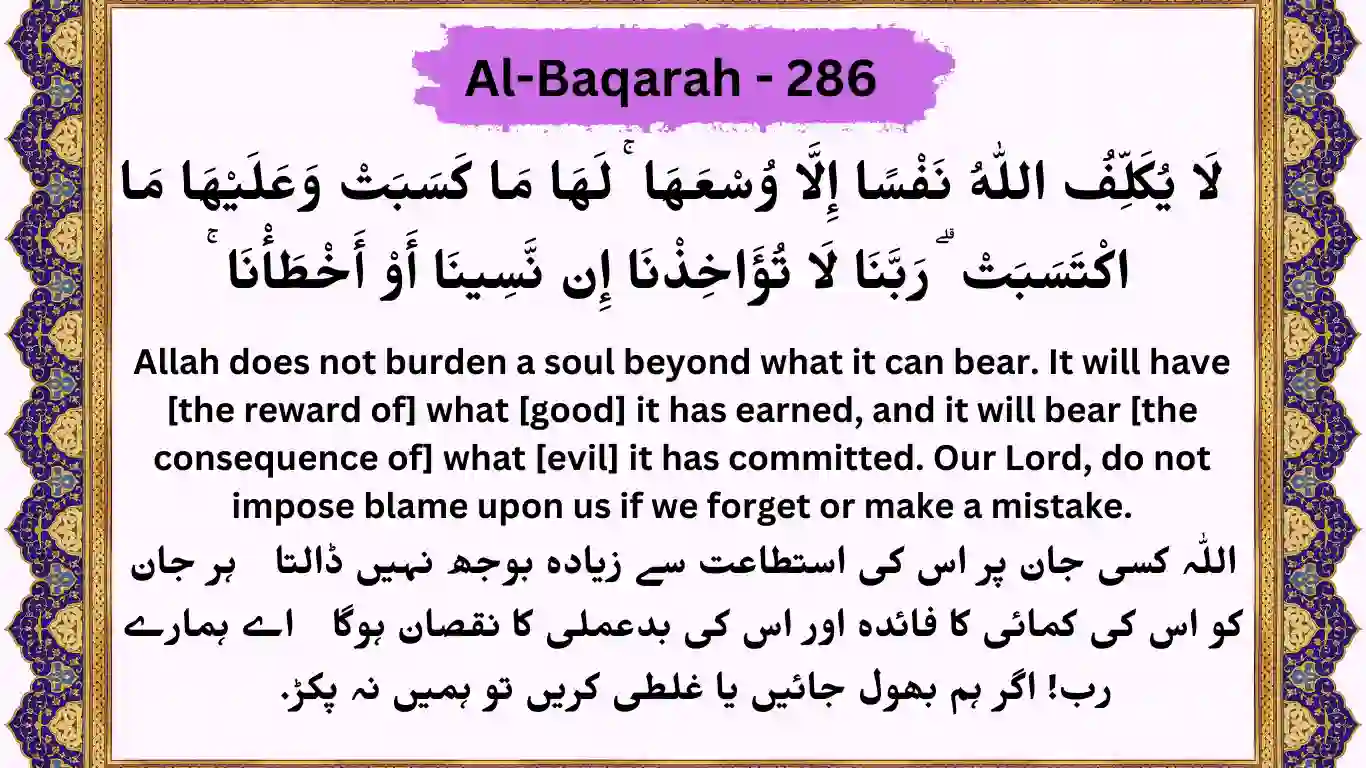Introduction
The phrase La Yukallifullahu Nafsani Illa Wus’aha is a powerful and comforting verse from the Quran. Found in Surah Al-Baqarah (2:286), it reassures Muslims of Allah’s mercy and fairness. This verse is often recited during times of hardship and is a source of strength for many. In this article, we will explore the full verse in Arabic, its meaning in English and Urdu, and its significance in the lives of believers.
| Surah Baqarah last 2 Ayat with Urdu translation Surah Baqarah Last 3 Ayat with Urdu Translation |
| Surah Baqarah Last Ruku | سورہ البقرہ لاسٹ رکوع |
| Hadith- Allahumma Inni As’aluka Al Jannah |
The Full Arabic Verse of Al-Baqarah – 286
The complete verse from Surah Al-Baqarah is as follows:
Arabic:
لَا يُكَلِّفُ اللّٰهُ نَفْسًا إِلَّا وُسْعَهَا ۚ لَهَا مَا كَسَبَتْ وَعَلَيْهَا مَا اكْتَسَبَتْ ۗ رَبَّنَا لَا تُؤَاخِذْنَا إِن نَّسِينَا أَوْ أَخْطَأْنَا ۚ
English Translation
“Allah does not burden a soul beyond what it can bear. It will have [the reward of] what [good] it has earned, and it will bear [the consequence of] what [evil] it has committed. Our Lord, do not impose blame upon us if we forget or make a mistake.”
Urdu Translation
اللّٰہ کسی جان پر اس کی استطاعت سے زیادہ بوجھ نہیں ڈالتا۔ ہر جان کو اس کی کمائی کا فائدہ اور اس کی بدعملی کا نقصان ہوگا۔ اے ہمارے رب! اگر ہم بھول جائیں یا غلطی کریں تو ہمیں نہ پکڑ۔
Significance of “la yukallifullahu nafsan illa wus’aha
1. Allah’s Infinite Mercy
This verse highlights the immense mercy of Allah. He knows the capacity of each individual and never burdens anyone with more than they can handle. This assurance helps believers remain steadfast during challenging times.
2. Personal Accountability
The verse emphasizes personal responsibility, stating that everyone will reap the rewards of their deeds and face the consequences of their misdeeds. This encourages self-awareness and accountability in life.
3. A Prayer of Hope
The latter part of the verse includes a heartfelt supplication asking Allah for forgiveness if we err due to forgetfulness or mistakes. It serves as a reminder of Allah’s forgiving nature.
Lessons from the Verse
- Resilience in Trials: This verse teaches believers to trust Allah’s wisdom during tough times.
- Gratitude for Fairness: Knowing that Allah is fair and does not overburden helps cultivate gratitude.
- Inspiration to Improve: Recognizing accountability motivates believers to strive for good deeds and avoid sinful actions.
How to Incorporate this Verse in Daily Life
- Recitation in Prayers: Include this verse in your daily supplications, especially during difficult moments.
- Reflection: Reflect on its meaning to develop patience and faith in Allah’s plan.
- Teaching Others: Share the wisdom of this verse with family and friends to inspire them during hardships.
FAQs
It means that Allah does not burden any soul beyond its capacity. Each individual is only held accountable for what they can handle, reflecting Allah’s justice and mercy.
This verse is located in Surah Al-Baqarah (2:286), one of the most significant chapters in the Quran.
This verse reassures believers that Allah understands their limits and will not place unbearable burdens upon them. It also reminds them to rely on Allah’s mercy and seek His forgiveness when mistakes occur.
Conclusion
The verse “la yukallifullahu nafsan illa wus’aha” is a beautiful reminder of Allah’s mercy, justice, and understanding. It encourages believers to trust Allah during difficulties, remain accountable, and seek forgiveness when they falter. Reflecting on this verse can strengthen one’s faith and inspire hope, making it a cornerstone of spiritual resilience. Share this wisdom with others to spread its blessings and comfort.




